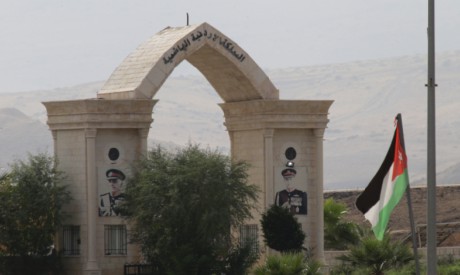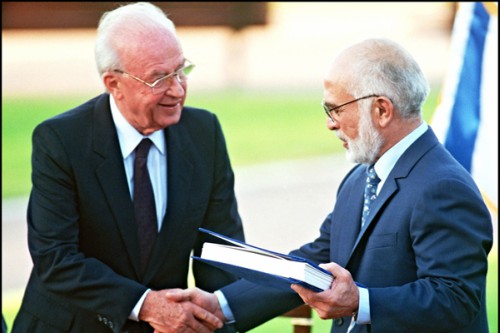
A Jordanian flag flies on a bridge leading from Israel to Jordan, in the Jordan valley area called Baqura, Jordanian territory that was leased to Israel under the 1994 peace agreement between the two countries, Monday, October 22, 2018. Jordan's King Abdullah II on Sunday said he has decided not to renew the lease on two small areas of Baqura and Ghamr, that was part of his country's landmark peace treaty with Israel. The leases expire next year after 25 years. (Photo: AP)
Jordan’s King Abdullah II has declared he does not intend to renew Appendix 1 sections b and c of the Wadi Araba Peace Treaty with Israel signed in 1994, which gave Israel a lease over two agricultural areas on the border, Al-Baqura and Al-Ghamr.
Jordanians, political elites and the media defended the move which seems to be very popular. There have been widespread protests recently demanding that Jordan extend sovereignty over these territories and not renew Israel’s lease.
After the king made up his mind, these protests became demonstrations supporting the royal decree as a sovereign decision.
King Abdullah tweeted: “Al-Baqura and Al-Ghamr have always been a top priority. Our decision is to end Al-Baqura and Al-Ghamr annex in the peace treaty due to our commitment to take decisions in the interests of Jordan and Jordanians.”
Later, in an open meeting with the press, the monarch said he notified Israel of his decision. “We are exercising our full sovereignty over our territories. Our priority in this regional climate is to protect our interests and do everything necessary for Jordan and Jordanians,” he added.
Meanwhile, unofficial Israeli circles viewed Jordan’s move as an indicator that bilateral diplomatic relations have cooled. On the official front, Prime Minister Binyamin Netanyahu said, while attending an event commemorating the assassination of Prime Minister Yitzhak Rabin – who signed the treaty with Jordan – at Mount Hertzl Cemetery in Jerusalem: “We will hold talks with Jordan to expand the current agreement, but the treaty overall is important and dear to both countries.”
Despite Jordan’s decision, Netanyahu said the peace treaty between the two countries is a “genuine peace treaty”.

File Photo: Jordan's King Hussein (R) and Israeli Premier Yitzhak Rabin (L) shake hands after they exchanged the documents of their countries' 1994 peace treaty on the shore of the Sea of Galilee (AFP)
Said Okasha, an expert at Al-Ahram Centre for Political and Strategic Studies, told Al-Ahram Weekly: “Israel’s view is that Jordanian pressure has resulted in this decision due to internal conditions caused by the economic crisis, in the presence of a political current – part of which is a strong Islamist current – that rejects the treaty altogether.”
Okasha added: “The treaty also strikes a balance needed in Jordanian-US relations, and therefore such a decision could open the door to suspended discussions on key issues such as settling Palestinians inside the country and Jordanian religious endowments in Jerusalem.”
On the Jordanian front, Roman Haddad, a writer at Al-Rai newspaper, said that Jordan’s decision is contradictory to all those who doubted Jordan’s sovereignty over these territories.
Even those who demanded the two annex clauses should be removed, hinted that decision makers in Jordan will not be able to take this step, because they believe Jordan has surrendered sovereignty.
“This is proof that Jordan did not surrender sovereignty when it leased out these territories for 25 years; everyone must admit that the royal decree is a superior sovereign decision,” he wrote.
In an article titled “Abdullah II proves Jordan’s political sovereignty with a military mind,” Haddad noted: “It is important to view this decision on several levels.
Jordan’s relations with Israel appear tense today and can worsen. Israel will be forced to sit at the negotiating table to end the two annex clauses, but at the same time it will carry out many procedural matters in the process.
It may take certain measures against the properties of Jordanians west of the River Jordan, and we will see growing Israeli pressure on the US to reduce UNRWA funding to put pressure on Jordan on the issue of refugees, in an attempt to transfer the problem into a domestic Jordanian one.
Haddad further expects Israel to take provocative steps that escalate tensions regarding Al-Aqsa Mosque and the Temple Mount.
Tarek Fahmi, an expert and director of Israeli studies at the National Centre for Middle East Studies, told the Weekly there are many challenges facing both sides if this scenario plays out.
Israel will most likely escalate its tone regarding the territories; for example, Israel’s minister of agriculture threatened to cut off water supplies there or other alternatives. Even Netanyahu told the security cabinet that he will submit an official request for renewal.
There is another problem on the borders of these territories because of existing settlements nearby.
However, the king has made up his mind and his popularity has soared with massive popular and media support, which makes it difficult for him to reverse his decision under the glare of local political forces such as the Muslim Brotherhood.
The decision will move from the realm of the masses and media to the realm of security between the two sides, since there will be negotiations, which opens matters to a variety of possible scenarios.
Israel could ask for the formation of a special committee that could take long years to reach a conclusion, or resort to an international forum through the International Court of Justice or an international commission.
Even though the text of the treaty does not stipulate this, there could be a scenario similar to that of Taba in Egypt. Another scenario is to leave Al-Baqura and postpone Al-Ghamr, which is the greater problem, thus imposing a half solution.
Fahmi added that now is not a good time for Israel to address outstanding issues, which is what Netanyahu implied by saying that peace with Jordan is genuine, and therefore he does not want to open other issues pertaining to the Palestinian cause, Jerusalem and others because time is against him.
He wants to maintain a stable peace with Egypt and Jordan as models, and therefore the coming phase could witness a push and pull between the two sides, but it would be difficult to say that this will reshape Jordanian-Israeli relations, since this would not serve the interests of either side.
* A version of this article appears in print in the 25 October, 2018 edition of Al-Ahram Weekly under the headline: Will Jordan rewrite relations with Israel?
Short link: